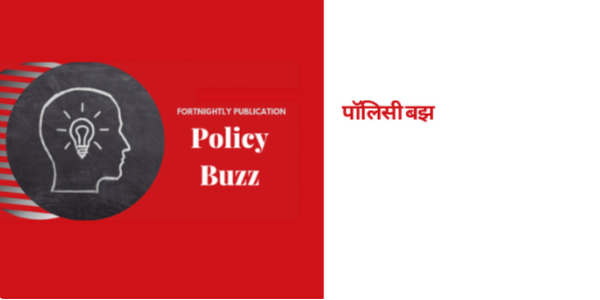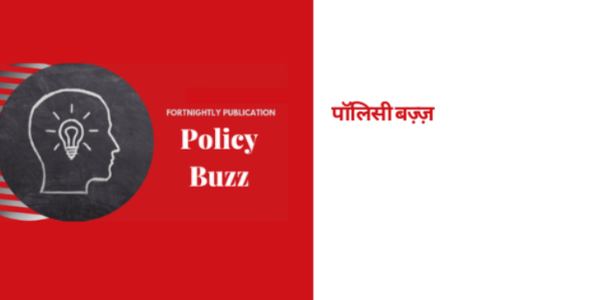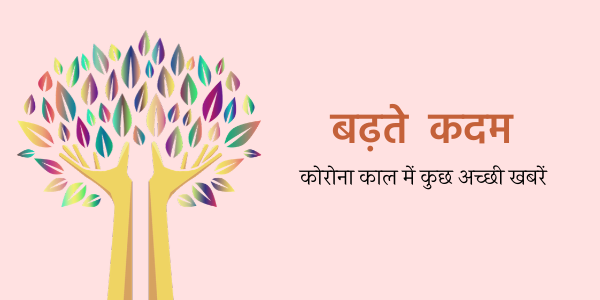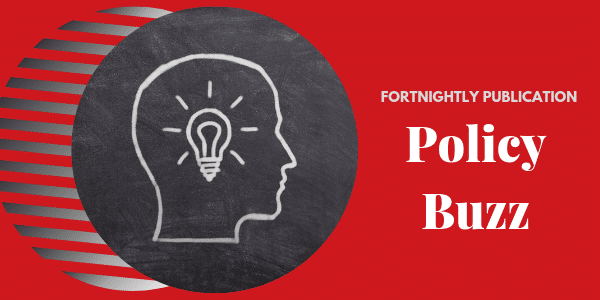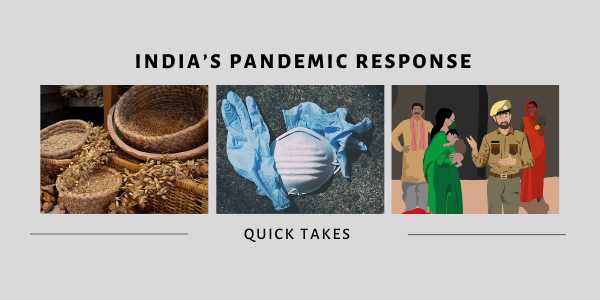From 31st July to 19th August, we hosted the ‘India’s Pandemic Response’ virtual event to unpack the policy response of the Union and state governments. The aim was to provide a comprehensive overview of the challenges, successes, and best practices of the government’s response. A one-of-a-kind virtual attempt, we organised three webinars, and also released several interactive knowledge offerings.
This blog will help you revisit the event, and explore how India dealt with the pandemic in the last few months.
Webinars
On Citizen Participation: On 31st July, we brought together several grassroots civil society organisations (CSOs) to discuss the role of CSOs in pandemic times. Senior managers of five organisations working on the frontline, were invited as speakers: Ibtada, Pahal, Jan Sahyog Vikas Sansthan, Samarthan, Aajeevika Bureau, and Project Potential. The five speakers spoke about the relief work that their organisations have been doing on-ground, their collaborations with the government and the challenges involved. The attendees in the webinar spanned 39 CSOs and eight states.
You can view the recording here.
On Funding and Finances: On 12th August, we hosted a virtual session — ‘Atmanirbharta in India’s States: Stressed Government Finances and Long-term Implications’ — to discuss the impact of the COVID-19 pandemic on public finances, and its long-term implications. The session was graced by three experts: Arvind Mayaram, Vice Chairman, Rajasthan Economic Transformation Advisory Council, Dr. Himani Baxi, Assistant Professor, Ahmedabad University, and Dr. D Vijay Kumar, Commissioner and Secretary to the Government of Meghalaya.
You can view the recording here.
On the Impact of the Pandemic on School Education and the New Education Policy (NEP): On 18th August, we organised an invite-only digital roundtable with experts who have extensively worked on public school education to discuss the closure of schools, the shift to e-learning platforms, and the NEP.
Knowledge Offerings
For 7 Days at 7 PM from 13 August, we released interactive knowledge offerings each day.
Inside Districts Hub: The Inside Districts series aims to document the oft-overlooked stories of government workers and officials working in the frontlines of rural India. Through this website, you will learn more about the challenges and aspirations of Corona Warriors in India’s five major Indian states.
India’s Fiscal Response to COVID-19: The Atmanirbhar Bharat Package: In May 2020, the Government of India announced the ₹20 lakh crore Atmanirbhar Bharat economic package. Using government reported data, this dashboard summarises the funds allocated under various components of the package.
Rural Livelihoods during the COVID-19 Pandemic: Deep Dive on MGNREGS: The factsheet looks at the Mahatma Gandhi National Rural Employment Guarantee Scheme (MGNREGS), which is a flagship scheme of the government to provide at least 100 days of guaranteed wage employment in a financial year (FY) to every rural household that demands work.
Distribution of Foodgrains during the COVID-19 Pandemic: The factsheet discusses the Pradhan Mantri Garib Kalyan Ann Yojana (PM-GKAY), which is a food security welfare scheme announced by the government for free distribution of foodgrains to vulnerable households.
India’s Public Insurance Gamble: In this interview, Dr. Jeffrey Hammer, who has extensively worked on the economics of providing public health services in India, spoke about Ayushman Bharat (the Union government’s new insurance programme).
Rajasthan’s ‘Model’ Response: Towards the end of March 2020, Bhilwara district in Rajasthan witnessed a growing concentration of infections, and was on its way to becoming an epicentre of the virus in the state; however, things changed quickly. This interactive piece explores how Bhilwara came to be a ‘model’ to aspire to.
School Education Finances: An Overview of Eight States: In June 2020, we published a study that provided an in-depth understanding of government school education financing in India. It analysed expenditures across eight States from Fiscal Year (FY) 2014-15 to FY 2017-18. In this factsheet, we capture key insights from the report along with updated information for FY 2020-21.
On the basis of the same study, we also published factsheets in Hindi for Bihar, Himachal Pradesh, Maharashtra, Madhya Pradesh, Rajasthan.
In order to initiate further conversation on government schemes and other COVID-19 policy responses, we invite you to organise virtual discussions in your organisations/circles on the various policy changes that the country has witnessed in the last few months.
We would also be happy to guide you or collaborate where relevant with you on these discussions. Share your plan with us at: [email protected].


